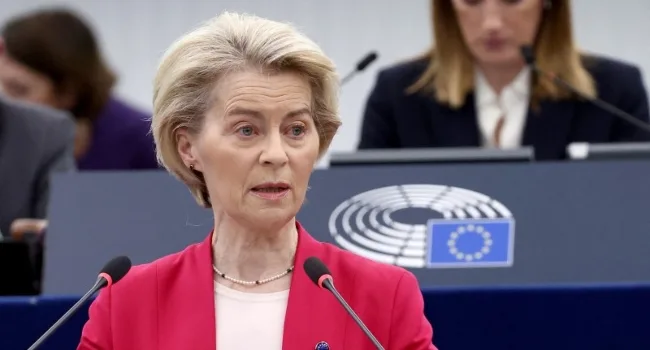European Commission President Ursula von der Leyen comfortably survived a no-confidence vote in the European Parliament on Thursday, brushing aside a challenge led by far-right lawmakers but exposing growing tensions over her leadership style and political alliances.
The motion of censure, triggered over von der Leyen’s handling of COVID-19 vaccine contracts—was rejected by a vote of 360 to 175 during a plenary session in Strasbourg. The outcome was widely expected, but the rare challenge revealed cracks in the coalition that has largely supported her since she took office in 2019.
“In a moment of global volatility and unpredictability, the EU needs strength, vision, and the capacity to act,” von der Leyen wrote on X (formerly Twitter) following the vote, though she was not present in the chamber. “As external forces seek to destabilize and divide us, it is our duty to respond in line with our values. Thank you, and long live Europe.”
Earlier this week, von der Leyen had strongly denounced the motion, calling it a conspiracy-fueled attempt to undermine European unity. She accused its backers of being “anti-vaxxers” and “apologists” for Russian President Vladimir Putin.
The no-confidence initiative was spearheaded by Romanian far-right MEP Gheorghe Piperea, who accused von der Leyen of a lack of transparency in negotiations with pharmaceutical giant Pfizer. Specifically, he cited unreleased text messages exchanged between von der Leyen and Pfizer’s CEO during the height of the pandemic, which have been at the center of multiple lawsuits and mounting criticism over opaque decision-making.
Although the motion failed, it gave lawmakers—including some from von der Leyen’s traditional allies on the centre-left and liberal-centrist blocs—an opportunity to voice discontent with her increasingly centralized style of leadership and political maneuvering.
One of the sharpest criticisms came from Iratxe García Pérez, head of the Socialists and Democrats (S&D) group, who warned that von der Leyen’s growing alignment with right-wing parties posed a serious risk to the EU’s political balance.
“Our support does not mean we are not critical of the European Commission,” García Pérez said. “The shift towards the far-right is a major cause for alarm.”
Valérie Hayer, leader of the centrist Renew group, echoed the sentiment. “The motion of censure has been overwhelmingly rejected,” she said on X. “But our support for von der Leyen is not unconditional.”
A major point of contention has been the centre-right European People’s Party (EPP), von der Leyen’s political family, teaming up with far-right MEPs to weaken or delay climate and environmental legislation—moves that have frustrated her more progressive backers.
Beyond the vaccine controversy, Piperea also accused the European Commission of meddling in Romania’s recent presidential election, in which pro-EU candidate Nicușor Dan narrowly defeated nationalist George Simion. The challenge came after Romania’s constitutional court annulled the first round over allegations of foreign interference and excessive online campaigning.
Although the motion received some backing from parts of the far-right and left, including allies of Hungary’s nationalist Prime Minister Viktor Orbán, it failed to garner unified support even within the European Conservatives and Reformists (ECR) group, to which Piperea belongs. Notably, the faction’s largest party—led by Italian Prime Minister Giorgia Meloni—declined to support the motion.
While von der Leyen has survived the vote, the episode underscores growing unease in Parliament as she eyes a second term at the helm of the European Commission ahead of 2024 EU elections. For now, she retains the confidence of the majority—but with strings increasingly attached.
AFP


